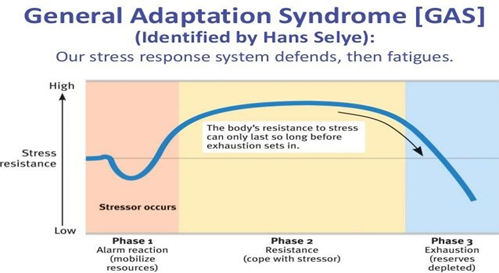The nurse recognizes that the client's energy has been depleted despite attempts to intervene and the client dies. This is a description of which phase of the General Adaptation Syndrome?
Exhaustion
Resistance
Alarm
Recovery
The Correct Answer is C
C. If the stressor persists for a prolonged period and the body is unable to adapt or cope effectively, it enters the exhaustion phase. During this phase, the body's resources become depleted. The client experiences decreased energy, reduced ability to cope with stress, and may develop stress-related illnesses or complications.

A. It is characterized by the body's immediate response to a stressor, where physiological changes occur such as increased heart rate, heightened senses, and activation of the fight-or-flight response.
B. After the initial alarm reaction, if the stressor persists, the body enters the resistance phase. In this phase, physiological changes stabilize as the body attempts to cope with the stressor.
D. This phase occurs if the stressor is removed or successfully managed, allowing the body to recover and return to a state of homeostasis. During recovery, the body repairs any damage caused by the stress response and replenishes its energy and resources.
Nursing Test Bank
Naxlex Comprehensive Predictor Exams
Related Questions
Correct Answer is D
Explanation
D. Assessing the client is the nurse's first responsibility when a medication error is suspected. The nurse should promptly assess the client's condition to determine if any harm has occurred as a result of the error. This assessment includes vital signs, physical assessment, and evaluation of any signs or symptoms related to the medication error.
A. Documenting the medication error is important for accurate record-keeping and subsequent investigation. However, it should not be the nurse's first action. The priority should be to assess and address any potential harm to the client.
B. Calling the physician may be necessary depending on the severity of the error and the client's condition. However, it is not the first responsibility of the nurse in response to a suspected medication error. The nurse's primary concern should be the immediate assessment and management of the client's condition.
C. Notifying the supervisor or charge nurse is an important step to report the incident and seek guidance on next steps. Supervisors can assist in managing the situation, implementing corrective measures, and ensuring appropriate documentation and reporting procedures are followed. This is typically one of the first actions after ensuring the client's safety.
Correct Answer is D
Explanation
D. Counting the radial pulse for 30 seconds and then multiplying the count by two gives an estimate of the client's heart rate per minute (bpm). This method is efficient and commonly used in clinical practice, especially if the client's pulse is regular.
A. Counting the radial pulse for two minutes is unnecessarily long and not standard practice. Typically, the radial pulse is counted for either 30 seconds or 60 seconds (one minute) to determine the client's heart rate. Multiplying the count by two for a 30-second count or directly using the count for a 60- second count provides the client's beats per minute (bpm).
B. The radial pulse is assessed by palpating the radial artery on the thumb side (or lateral side) of the client's wrist. The nurse places the index and middle fingers gently over the radial artery and applies light pressure to feel the pulse rhythm and rate.
C. Using the thumb to count the pulse is not recommended because the thumb has its own pulse, which could interfere with accurately assessing the client's radial pulse.
Whether you are a student looking to ace your exams or a practicing nurse seeking to enhance your expertise , our nursing education contents will empower you with the confidence and competence to make a difference in the lives of patients and become a respected leader in the healthcare field.
Visit Naxlex, invest in your future and unlock endless possibilities with our unparalleled nursing education contents today
Report Wrong Answer on the Current Question
Do you disagree with the answer? If yes, what is your expected answer? Explain.
Kindly be descriptive with the issue you are facing.
